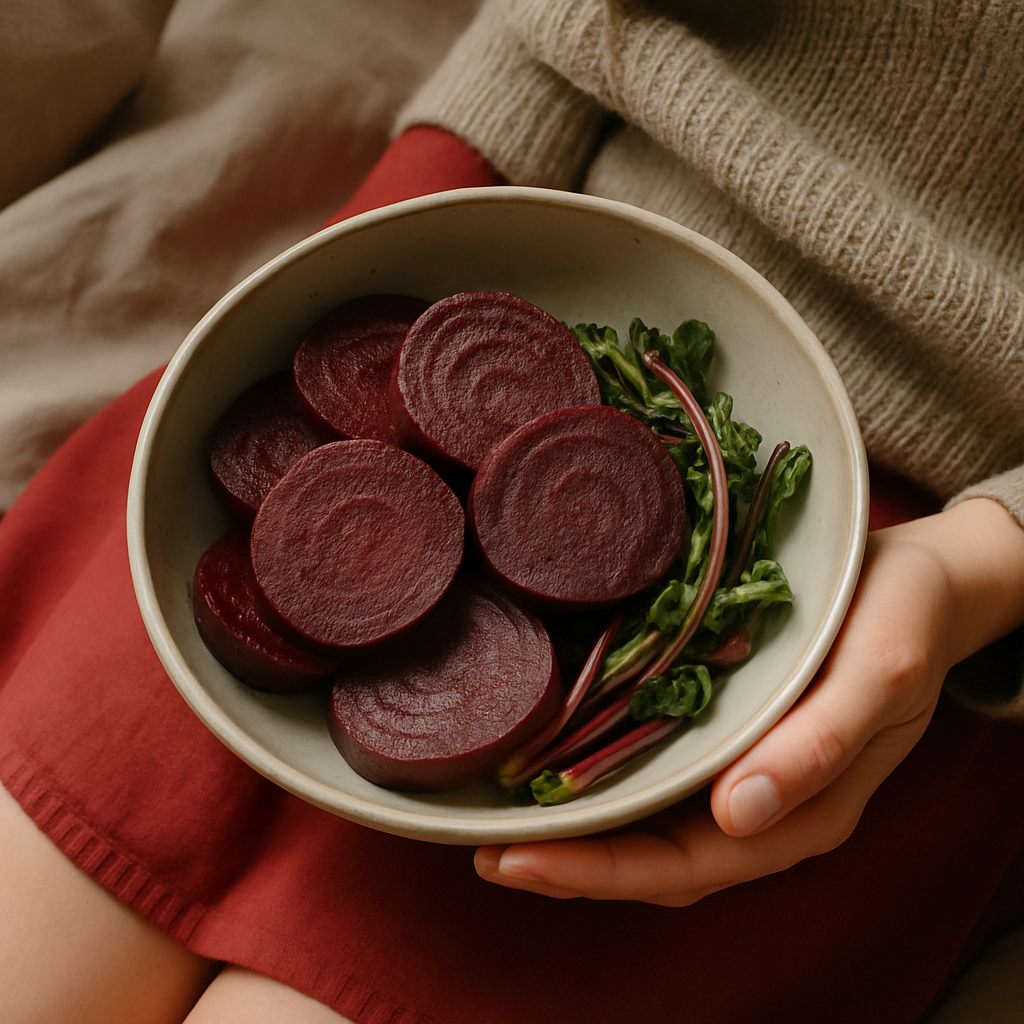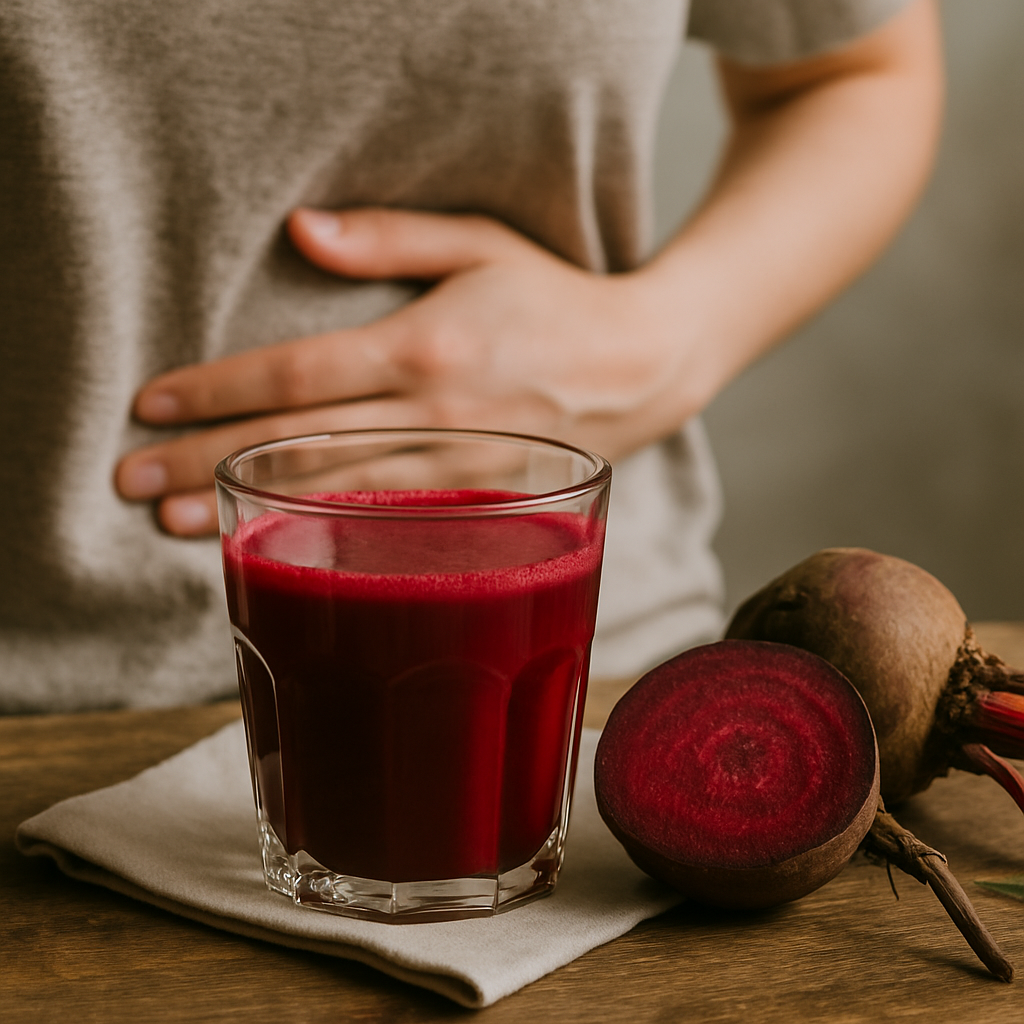Can We Eat Beetroot During Periods? Ayurvedic Perspective

Periods are never the same for every woman. Some deal with light cramps and a bit of moodiness, while others struggle with fatigue, heavy flow, or painful bloating. Naturally, food choices during this time can make a big difference. One question that comes up often is: can we eat beetroot during periods or even can we drink beetroot juice during periods? Many women are curious about whether beetroot can actually help or if it might worsen symptoms like heavy bleeding.
In Ayurveda and even modern nutrition, beetroot is considered a powerful food for women’s health. It is rich in iron, folate, and natural nitrates that support blood circulation. But when it comes to beetroot during periods, the answers are not always black and white. Some say it helps with energy and replenishing iron, while others wonder does beetroot cause heavy periods or does beetroot induce periods. Let’s explore the nutritional and Ayurvedic perspective to get a clear, balanced view.
Beetroot and Menstrual Health
Nutritional Value of Beetroot for Women
Beetroot is like a small powerhouse of nutrients. It contains iron, folate, vitamin C, and antioxidants. For women, especially during menstruation, iron is super important because blood loss can lower iron levels quickly. Eating beetroot during periods might help fight tiredness and prevent anemia.
Beets are also known for improving circulation thanks to nitrates, which convert to nitric oxide in the body. This widens blood vessels, helping oxygen move better through the body. For someone dealing with fatigue and low energy, this can feel like a small boost.
Is Beetroot Good for Periods?
So is beetroot good for periods? In short, yes — but with balance. Beetroot may help with energy, reduce weakness, and even improve mood because of its folate content. However, some women feel it increases their flow, which can be uncomfortable. That doesn’t mean everyone will have the same reaction.

Can We Eat Beetroot During Periods?
Eating Beetroot During Periods for Energy and Iron
When you’re menstruating, your body loses iron. This is why many women feel weak or even dizzy. Beetroot for periods can be a natural solution — just a small serving in your salad, smoothie, or curry may give you that extra iron and stamina.
Many ask: can I eat beetroot during periods safely? The answer is usually yes. It’s a safe vegetable, and unless you have a specific medical condition (like kidney stones or very heavy bleeding), beetroot is unlikely to harm you.
Can I Eat Beetroot During Periods Safely?
Yes, but moderation matters. If you already experience very heavy bleeding, it may be best to keep beetroot in small amounts or check with your doctor. Ayurveda often suggests balancing foods — so pairing beetroot with grounding, warm spices like cumin or ginger can make it easier on digestion and the system.
Beetroot Juice for Periods: Benefits and Risks
Beetroot juice is trendy these days. Many women drink it for glowing skin, detox, and stamina. But beetroot juice during periods is a bit more complicated. Juice is more concentrated than cooked beetroot. This means it delivers nutrients fast, but it may also make the flow seem heavier for some women.
Still, if you feel exhausted or your energy crashes, a glass of beetroot juice for periods can be refreshing. Just remember not to overdo it. Ayurveda usually recommends whole foods over concentrated juices, so balance is key.

Effects of Beetroot on Menstrual Cycle
Does Beetroot Cause Heavy Periods?
One of the biggest concerns people have is: does beetroot cause heavy periods? The answer isn’t the same for everyone. Beetroot contains natural compounds that improve blood circulation. For some women, this can feel like their flow becomes heavier, but in reality, it’s often just smoother blood flow rather than an actual increase in the amount.
If you already experience heavy bleeding, it might feel like beetroot makes it worse. But if your flow is usually light or irregular, beetroot may actually help normalize it. The key is listening to your own body and adjusting accordingly.
Does Beetroot Induce Periods or Increase Blood Flow?
Another common question: does beetroot induce periods? While there is no strong scientific proof that beetroot directly triggers menstruation, many women believe that beetroot in periods helps regulate the cycle. Its natural nitrates improve circulation, which might support the shedding of the uterine lining more effectively.
Some Ayurvedic practitioners suggest beetroot increases warmth in the body, which could stimulate menstrual flow. So if you’re asking does beetroot increase blood flow during periods, the simple answer is yes, it can — but this effect is usually gentle, not drastic.
Is Beetroot Good for Irregular Periods?
For women struggling with irregular cycles, diet plays a bigger role than most people think. Iron-rich foods like beetroot may not “fix” irregular periods alone, but they help support hormonal balance indirectly by improving energy and reducing stress on the body.
Is beetroot good for irregular periods? Yes, many women with irregular cycles benefit from its nutrients, though lifestyle, stress, and other dietary habits still matter more in the long run. If your cycles are irregular due to PCOS, thyroid, or stress, beetroot can be a supportive food but not a magical cure.
How Ayurveda Explains Beetroot for Periods
Ayurveda takes a holistic approach to food and health. According to Ayurvedic texts, beets are considered grounding and slightly heating in nature. This means they can help balance Vata (which governs movement and often gets imbalanced during menstruation) but might aggravate Pitta if taken in excess.
From this perspective, eating beetroot during periods is beneficial for women who feel weak, cold, or tired during their cycle. However, women who already have strong Pitta symptoms (like heavy bleeding, heat, or irritability) may need to eat it in moderation.
Ayurvedic practitioners often recommend combining beetroot with spices like cumin, coriander, or fennel. These not only improve digestion but also balance the warming effect of beets. Drinking beetroot juice during periods with a touch of ginger or lemon is seen as a gentle tonic, supporting both blood flow and energy levels.
Conclusion
So, can we eat beetroot in periods? Yes, absolutely — but as with most things, moderation and balance matter. For women with low energy, dizziness, or light flow, beetroot for periods can be a supportive food, helping with iron levels and circulation. But if your main struggle is heavy bleeding, you may want to keep it in smaller amounts or opt for cooked versions instead of juice.
The bottom line: listen to your body, respect your cycle, and use foods like beetroot as supportive tools rather than strict rules.
FAQs
Is beetroot juice good for irregular periods?
Yes, drinking beetroot juice for periods can help if your cycles are irregular. It provides iron and folate, which support healthy blood production, and its natural circulation-boosting compounds may gently encourage a timely flow. But keep in mind, irregular periods often have deeper causes — like stress, hormonal imbalance, or conditions like PCOS. Beetroot alone won’t “fix” the issue, but it can definitely be part of a supportive diet.
Does beetroot cause heavy periods or relieve them?
This is one of those confusing questions where both answers can be true. Some women report that beetroot makes their bleeding heavier, likely because it helps blood flow more smoothly. For others, especially those with lighter or irregular cycles, beetroot seems to balance things out. If you’re worried, try eating small amounts and notice how your body responds instead of avoiding it completely.
What are the benefits of eating beetroot during periods?
The main benefits include:
-
Iron boost: Replenishes iron lost during bleeding.
-
Energy: Helps reduce tiredness and fatigue.
-
Better circulation: Natural nitrates improve blood flow.
-
Mood support: Folate supports brain health, which can ease mood swings.
-
Detox support: Antioxidants help cleanse the body naturally.
So yes, eating beetroot during periods can be one of those simple diet hacks that make you feel stronger.
Beetroot in Everyday Menstrual Care
The beauty of beetroot is that it’s versatile. You don’t have to just drink juice. You can roast it, toss it into salads, blend it into smoothies, or even add it to soups. Ayurveda often favors cooked beetroot over raw because it’s easier to digest, especially during sensitive days of the cycle.
Beetroot juice during periods can be refreshing if you feel drained, but cooked beetroot with spices may be gentler for women with heavy bleeding. Experiment with both and see what feels right for you. Remember: your cycle is unique, and so are your needs.
When to Avoid or Limit Beetroot During Periods
While beetroot is safe for most women, there are a few cases where moderation is wise:
-
If you have very heavy bleeding, limit juice and eat smaller portions.
-
If you suffer from kidney stones, beets are high in oxalates, which may make things worse.
-
If your stomach is sensitive, raw beetroot may cause bloating or discomfort.
In these cases, it’s not about avoiding beetroot completely but about eating it smartly. Cooked, spiced beetroot is often more tolerable.
Final Thoughts
So, circling back: can we eat beetroot during periods? Yes. Can we drink beetroot juice during periods? Also yes, but with a little caution if your flow is already heavy. Beetroot is a natural, nutrient-packed food that supports women’s health in many ways — from boosting iron to improving energy and circulation.
Beetroot for periods may not be a miracle cure, but it’s a simple, affordable, and accessible addition to your diet. Ayurveda and modern science both agree: nature often gives us what our bodies need, we just need to listen and adjust.
Got any more questions?
Ask Ayurvedic doctor a question and get a consultation online on the problem of your concern in a free or paid mode.
More than 2,000 experienced doctors work and wait for your questions on our site and help users to solve their health problems every day.

